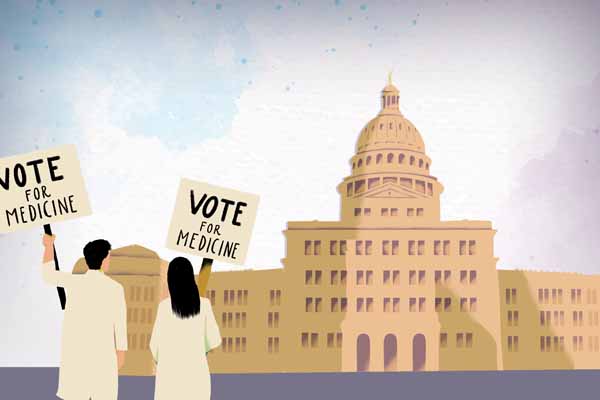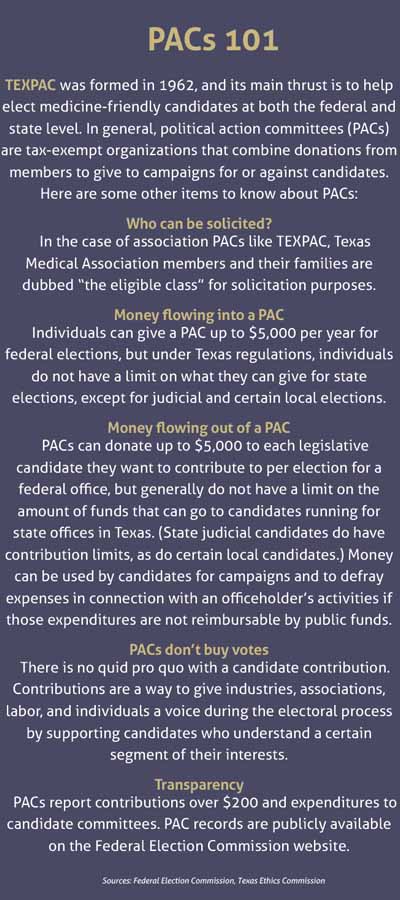
For San Antonio radiologist Zeke Silva, MD, the importance of the Texas Medical Association Political Action Committee (TEXPAC), TMA’s bipartisan political arm, was spelled out clearly during the middle of the 2023 Texas Legislature session.
What he described as an “especially concerning bill,” which would have given physical therapists direct access to patients without a physician referral for an extended period of time, was the only scope-of-practice measure that year to reach the House floor for a vote.
Dr. Silva, chair of TMA’s Council on Legislation, says this type of bill-reading is usually just a “technicality before a bill goes to the governor’s desk.” This time, however, it became a battleground for medicine. House Bill 2553 was well on its way to passage when it was blocked by medicine-friendly lawmakers on a final reading and scrapped.
“If not for grassroots efforts [by TMA] and legislators endorsed by TEXPAC, the bill would have likely become law,” Dr. Silva recalled. “These legislators know that a TEXPAC endorsement matters.”
With more than 5,100 physician, alliance, resident, and student members, TMA’s political action committee works to advance TMA’s mission through political education and activism, as well as in the election of medicine-friendly candidates at the local, state, and federal level. So far, 97% of TEXPAC-endorsed candidates have gone on to win election.
TEXPAC endorsements help generate victories like the spiking of HB 2553 with physician advocacy by TMA, TMA Alliance, and county medical society members; through a dogged, systematic evaluation of candidates who have the profession’s best interests at heart; and yes, money.
“You have to help people raise money if you want to help elect your candidate who’s supportive of the house of medicine,” said Austin neurologist Sara Austin, MD, chair of TEXPAC. “You have to help them raise money so that they can [communicate with their voters] to get elected.”
But TEXPAC leaders are very clear that contributions only go toward one purpose: to support medicine’s agenda.
Past TEXPAC Chair Jimmy Widmer, MD, says he started every meeting with a reminder that members shouldn’t view the discussions about policy or endorsements through Republican, Democratic, or even independent lenses.
“I made the plea when members came in the room, they were there to represent the party of medicine,” the Temple internist said.
PAC-ing a punch
The slogan has turned into a unifying one, says Christine Mojezati, who was TEXPAC director at the time this article was written.
Since 2016, TEXPAC membership has grown from about 3,400 to its current 5,100.
“One of the biggest changes TEXPAC has seen was when our members embraced that we are the party of medicine,” Ms. Mojezati said. “That’s really helped. It’s brought in a lot of people who felt TEXPAC didn’t represent them.”
Formed in 1962, TEXPAC was created with only a handful of members, most of them concerned about government’s increasing intrusion into the practice of medicine as Congress debated creating the Medicare program. Over the past 60 years, TEXPAC has compiled an impressive record of achievement, from unseating numerous incumbents hostile to organized medicine’s agenda, to electing several of its own physicians to state House and Senate seats, to reshaping a trial lawyer-dominated Texas Supreme Court.
All those victories played a direct role in some of TMA’s biggest wins in the legislative arena, including the 2003 medical tort reforms that stopped the epidemic of lawsuit abuse, the 2021 gold-card prior authorization exemption law, and years of halting scope creep.
“I give TEXPAC a lot of credit, because they’ve really worked … for years, decades, trying to preserve patients’ and physicians’ autonomy through careful endorsement and support of candidates who will listen to their physician supporters,” Dr. Austin said.
TEXPAC’s 2023 revenue was $1.2 million, and donations go to federal and state candidates. (See “PACs 101,” page 19.)
Growth in its ranks and annual budget have not only aided in the election of pro-medicine lawmakers, but in hiking the number of physician legislators over the last 10 years. (See “Physician Assistance,” page 27.)
“When I came in as PAC director in 2013, we had one senator and one state representative who were physicians in the legislature. Now we have two state senators, three representatives, and a statewide elected official that’s a former [TMA Council on Legislation] chair,” said Clayton Stewart, TMA’s vice president of public affairs and chief lobbyist. “There are other [physicians] who have gone through the vetting process and are vetting it to run in the future.”
With more physician legislators in Texas, there will be more friends of medicine on House and Senate committees, and possible chairs of those committees handling medicine’s issues, he adds.
“If you look at our successes in the last few legislative sessions, what we’re able to accomplish at TEXPAC and at TMA pays for itself from a monetary perspective,” Dr. Silva said (www.texmed.org/advocacy).
While TEXPAC’s achievements are impressive, so are the ranks of fellow PACs, including those with anti-medicine interests.
Other PACs representing associations are larger monetarily, according to Ms. Mojezati. The Texas Association of Realtors PAC, for instance, has on average $10 million cash on hand and raises $6 million annually. The Texas Association of Trial Lawyers PAC raised $2 million last year, and the Texas Optometric PAC continually raises over $1 million each year.

Relationships translate to victories
But a TEXPAC contribution, of which there are varying levels, is just one part of how effective advocacy works for TMA.
TMA leaders say the highly developed level of real grassroots activism on the part of individual physicians, their spouses, TMA Alliance chapters, and county medical societies sets TEXPAC apart from other political action committees, and combine to foster lasting relationships with elected officials.
For Dr. Widmer, TEXPAC involvement began early. His curiosity started before medical school during an internship working with TMA’s advocacy team as an undergraduate student.
“I realized at that point that you can’t be involved in the policy of health care without being involved in the politics of health care,” he said.
At first, Jenny Shepherd, TMAA president and TEXPAC board member, believed she wasn’t qualified to be an advocate for medicine, but knew she had the skills to build relationships. (See “A Party for Medicine,” page 28.)
“In some cases, [TMA members] don’t even know there is a PAC,” she said. “They don’t understand how they could be involved, don’t know about PAC membership, and don’t know they could advocate for themselves. The education piece is really important, even for physicians who may be familiar with policy.”
She now encourages TEXPAC members to begin their own grassroots advocacy journeys by volunteering to campaign for candidates; hosting fundraisers for TEXPAC-endorsed candidates; and attending First Tuesdays at the Capitol, which are designated days during the legislative session when physicians, alliance members, and medical students meet with their legislators regarding important health issues (www.texmed.org/firsttuesdays).
Community work also happens through county medical society events that help bring awareness of the medical community to current and potential legislators. In August, for example, Brownsville physicians hosted an event at which bicycles, fishing poles, school supplies, books, and helmets were given away to area children. (See “Within Reach,” page 33.) Current and prospective lawmakers were in attendance.
“When you go and you talk to those legislators [at those events], they remember you,” Ms. Shepherd said. “They remember that medicine is a good player.”
County medical societies are also heavily involved in TEXPAC’s thorough, four-step candidate endorsement process. (See “One Voice,” page 22.)
“We hold [candidates] accountable,” Ms. Mojezati said. “There is no rubber-stamp endorsement. There’s a process.”
CMS members will interview candidates based on their position on medicine’s issues. CMS executive directors send TEXPAC feedback from their members and if there is a recommendation for endorsement, it is presented to the TEXPAC Candidate Evaluation Committee for further discussion.
Tarrant County Medical Society Executive Vice President Brian Swift says allowing CMS members to be involved in the evaluation process has led to the election of some of the most “significant candidates for medicine.”
“We prioritize getting to know all who live in our community,” Mr. Swift said. “By the time someone decides to run for office, we have already established a relationship with them locally.”
Dr. Widmer also reminds physicians that candidate evaluation committee meetings are open to all TEXPAC members and encourages them to participate in the discussions.
“Whether you like TEXPAC or whether you’re upset by something that’s been done in the past [by the PAC], come get involved and come help to make a better future,” he said. “Because that’s what we’re trying to do: to improve the practice of medicine within the state of Texas, and ultimately allow physicians to do what we’ve been trained to do, and that’s to take great care of patients.”
Texas Medical Association Political Action Committee (TEXPAC) is a bipartisan political action committee of TMA and affiliated with the American Medical Association Political Action Committee (AMPAC) for congressional contribution purposes only. Its goal is to support and elect pro-medicine candidates at the federal level and the state level. Voluntary contributions by individuals to TEXPAC should be written on personal checks. Funds attributed to individuals or professional associations (PAs) that would exceed federal contribution limits will be placed in the TEXPAC statewide account to support nonfederal political candidates. Contributions are not limited to the suggested amounts. TEXPAC will not favor or disadvantage anyone based on the amounts or failure to make contributions. Contributions used for federal purposes are subject to the prohibitions and limitations of the Federal Election Campaign Act.
Contributions or gifts to TEXPAC or any county medical society PAC are not deductible as charitable contributions or business expenses for federal income tax purposes.
Federal law requires us to use our best efforts to collect and report the name, mailing address, occupation, and name of employer of individuals whose contributions exceed $200 in a calendar year. To satisfy this regulation, please include your occupation and employer information in the space provided. Contributions from a practice business account must disclose the name of the practice and the allocation of contributions for each contributing owner. Should you have any questions, please call TEXPAC at (512) 370-1365.